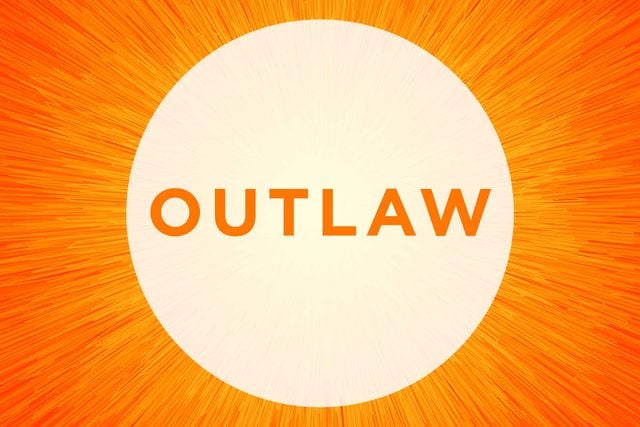What Is the Denotative Meaning of the Word Feverishly
7 Common Words That Mean the Exact Opposite of What You Think
"Outlaw," "scan," and "irregardless"... you're using them all wrong.
 Emma Kapotes/Rd.com
Emma Kapotes/Rd.com
Outlaw (n.)
People think it means: Someone who has broken the law.
But it really means: A person excluded from protection of the law.
In the historical sense, Robin Hood is not an outlaw because he robs from the rich; he is an outlaw because he has lost all legal protection. That means you, me, or the Sheriff of Nottingham could legally stab 'ole Robin in public and not be prosecuted for it—he is outside the law. Sad to say, but it's probably safer to hang out with in-laws. We bet you've never realized these words are the same forwards and backwards.
 Emma Kapotes/Rd.com
Emma Kapotes/Rd.com
Factoid
People think it means: A fun, trivial fact.
But it really means: A fun, FALSE fact.
Coined by Normal Mailer in 1973 to describe "facts" invented by gossip reporters, this word has gone off the semantic rails in a few short decades. For the true meaning, look to the suffix: -oid. If a humanoid is something that resembles a human (but isn't) and a planetoid resembles a planet (but isn't), then it makes sense that a factoid is a bit of information that resembles a fact—but isn't one. Say "fun fact" if that's really what you mean. Read up on the 15 common words that used to have completely different meanings.
 Emma Kapotes/Rd.com
Emma Kapotes/Rd.com
Scan
People think it means: To skim.
But it really means: To thoroughly examine something point by point.
Coming from a 14th century word for "counting off metric feet" in poetry, scan was synonymous with close examination until it came to mean the opposite in the 1920s (I blame factory robots, personally). See also: Peruse, which often suffers the same misuse. Here are more words with surprising meanings.
 Emma Kapotes/Rd.com
Emma Kapotes/Rd.com
Nonplussed
People think it means: Undisturbed.
But it really means: Utterly baffled.
This word is a self-fulfilling prophecy, nonplussing generations of readers who forget that it means confused, not non-confused. The word comes from the Latin non plus, meaning "no more," as in, "I am in a state where I can say, think, or do no more. I am nonplussed." Check out the 20 words even smart people mispronounce.
 Emma Kapotes/Rd.com
Emma Kapotes/Rd.com
Enervated
People think it means: Energized.
But it really means: Weakened.
The word nerve originally referred to sinews and tendons, but around the 1600s became a byword for strength and vigor (hence, "You've got a lot of nerve!" or "If I only had the noive!"). Similarly, the opposite word—enervate—first meant to cut the nerves or tendons, then later to lessen the vitality or strength of something. And that's what it means today: to weaken. Test your knowledge of eighth grade English lessons with these 33 middle school vocabulary words adults still get wrong.
 Emma Kapotes/Rd.com
Emma Kapotes/Rd.com
Inflammable
People think it mean: Not flammable.
But it really means: Totally super flammable.
The trouble here is that the prefix in- can mean two completely different things; sometimes, in- means "not" (incapable, inarticulate, etc.) and sometimes it means, well, in or into (incarcerate, income, etc.). In the case of inflammable (which was a word long before flammable entered the language), in- takes the "into" meaning, signifying that something is easily engulfed in flames. A dangerous mistake to make, which is why this word is usually accompanied by a picture of a big-ole scary fire. Check out the words and phrases that used to be insults but are now compliments.
 Emma Kapotes/Rd.com
Emma Kapotes/Rd.com
Irregardless
People think it means: Regardless.
But it really means: With regard, or nothing at all.
Maybe one of the most argued-over words besides "irony" and "selfie," irregardless has been in popular usage for about a century and is still spat upon by grammar snobs. Why? The prefix and suffix cancel each other out. The prefix ir- means "not," while the suffix -less means "without," literally translating the word to "not without regard"… a.k.a., "with regard." As that's the opposite of the word's intended meaning, sticklers insist on permanently deleting it from our collective vocabulary, while most English speakers go on using it, irregardless of the consequences. Make sure you know the 15 redundant words that make you sound ignorant.
Originally Published: August 23, 2018
![]()
Sign up for articles sent right to your inbox
Enjoy the best stories, advice & jokes delivered right to your inbox!

Subscribe & SAVE Save Up To 84%!
What Is the Denotative Meaning of the Word Feverishly
Source: https://www.rd.com/list/opposite-words/
0 Response to "What Is the Denotative Meaning of the Word Feverishly"
Post a Comment